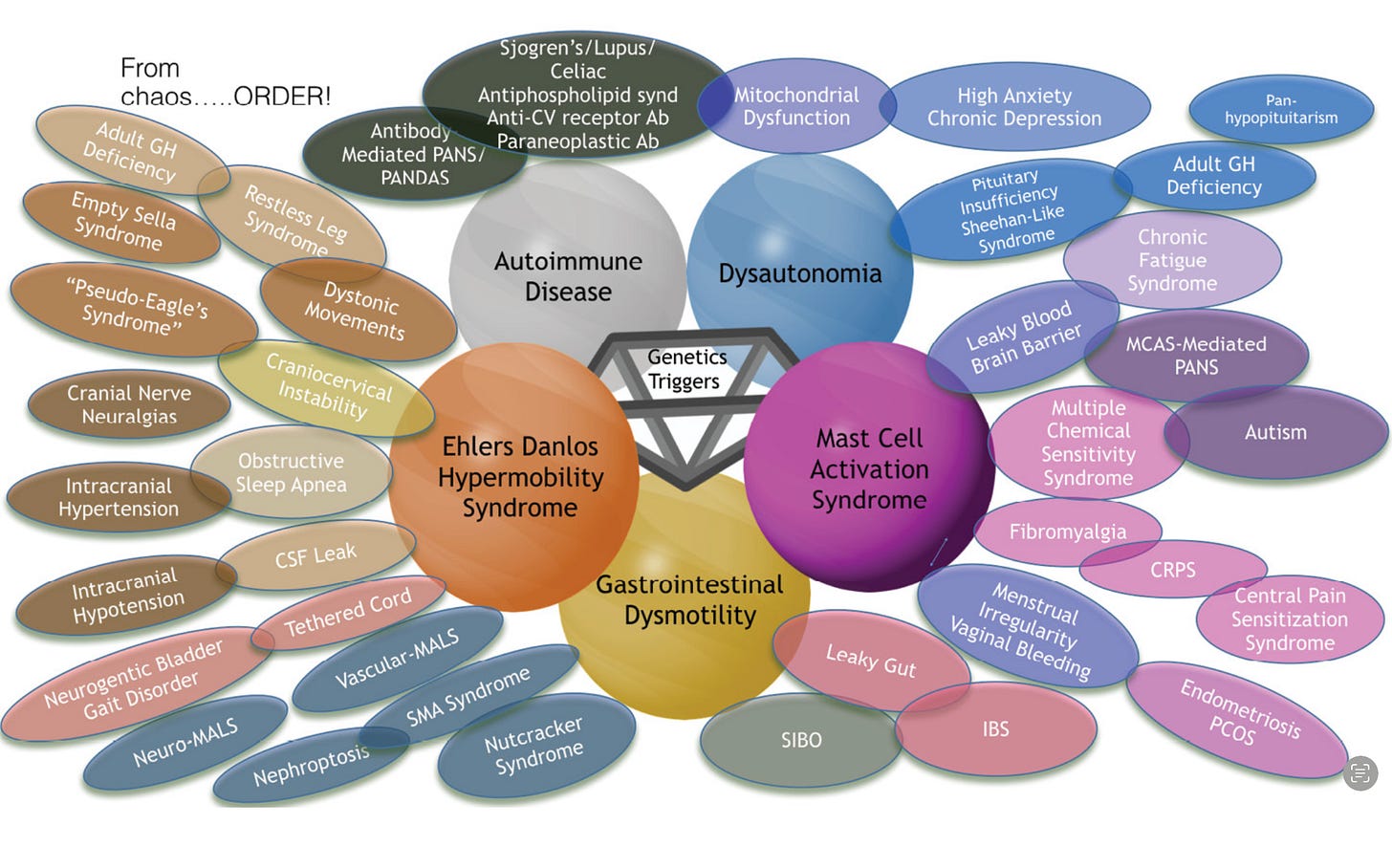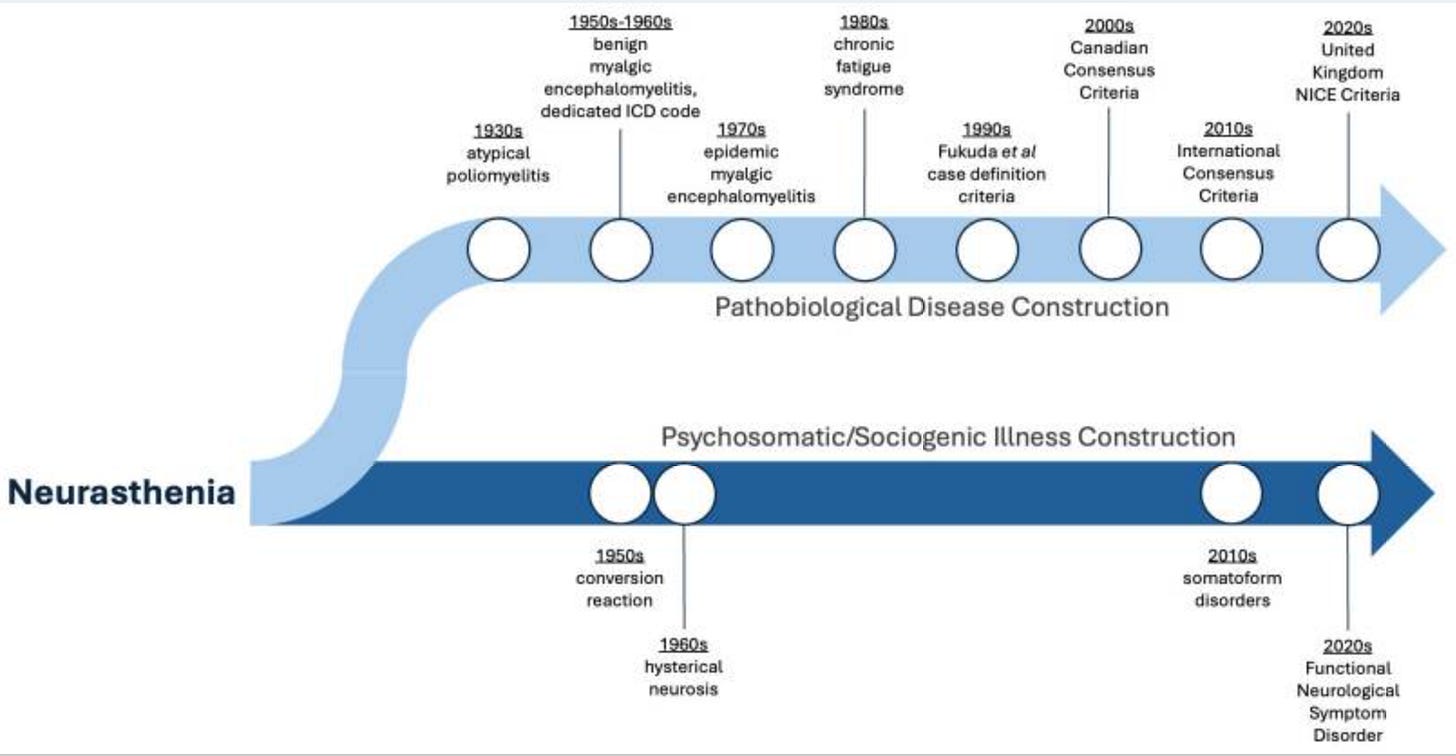POTS is a real trend, and it has a long history
new video! plus, a few gems from my source list
Okay I promise I’m gonna stop talking about this book now, you guys, but I just couldn’t get Suzanne O’Sullivan’s terrible argument about POTS being psychosomatic out of my head, so I had to do a video about it!
I also could not find a history of POTS anywhere, so I made one — it starts at 20:08.
Here are a few of my favorite sources from the making of this video:
🔬Autonomic Neuroscience Special Issue on POTS, 2018
This is a super comprehensive collection of papers on every aspect of POTS, from autoimmunity to headaches to stomach problems.
I used this paper on the patient perspective in particular, because O’Sullivan’s argument that people are being made sick by diagnosis-run-amok doesn’t track with what POTS patients are actually experiencing, which is years of being symptomatic without a label, multiple misdiagnoses, severe lack of knowledgeable physicians, and traveling hundreds of miles to get care.
📖 Disjointed: Navigating the Diagnosis and Management of hypermobile Ehlers-Danlos Syndrome and Hypermobility Spectrum Disorders, 2020, edited by Diana Jovin
Tbh I didn’t really know much about hEDS before developing POTS, but it’s basically impossible to research POTS without also learning a bunch of stuff about hEDS, because they’re such ‘common co-travelers’.
O’Sullivan is confused at how hEDS, POTS, MCAS, Chiari malformations, migraine, IBS, autism and ADHD could all be clustered together in so many of her young patients, and she even says that these patients are ‘a major reason’ she wrote a book arguing that overdiagnosis is making people psychosomatically sick!
The Dysautonomia chapter of Disjointed offers a counter to this in the form of what pediatric cardiologist Andrew J. Maxwell calls ‘the Pentad super-syndrome’
Maxwell proposes several ways these seemingly disconnected conditions could all be linked together and cause further issues. It’s speculative and definitely needs more research, but why wouldn’t you at least be a little bit curious about the possibility that there is something going on we just don’t understand yet, rather than concluding it must all be psychological?
📝 Long COVID Is Not a Functional Neurologic Disorder, Davenport et al, 2024
A collection of the current evidence against the claim that LC is psychosomatic
The authors actually list all the conditions from the pentad above as things that are commonly misdiagnosed through a psychosomatic lens.
They argue that ‘two divergent scholarly and clinical paths’ began with the diagnosis of neurasthenia in the 19th century. One, focused on biology, produced the diagnosis of ME/CFS, and the other, focused on psychology, led to Functional Neurologic Disorder.
📝 Defining the Chronic Complexities of hEDS and HSD: A Global Survey of Diagnostic Challenges, Life-Long Comorbidities, and Unmet Needs, Daylor et al, 2025
One of the most interesting things I learned at the Dysautonomia Conference this year is that a lot of people with hEDS can recall a ‘triggering event’ that either kicked off or worsened their symptoms — 70%, according to this paper!
The researchers wonder if thinking of hEDS strictly as a connective tissue disorder is missing the bigger picture, as the most-reported symptoms go far beyond joint issues, encompassing a ‘high prevalence of immune, neurological, gastrointestinal, and autonomic dysfunctions’
There are a lot of bits and pieces in the video from stuff I’ve written this year, so if you want to retrace my steps, check out these posts:







I’m finding more confusing why they think that better diagnostic techniques and more research into all these conditions is causing them? Surely better everything means more diagnosis over time which is a positive thing for all suffering with these things? It’s this insidious idea that people pretend to be ill to avoid work - nope we would rather be working than living off the scraps fed to us by government!
Haven’t got the energy to watch the video yet but saved for later! You’ll find this interesting: https://www.healthrising.org/blog/2023/10/12/septad-chronic-fatigue-syndrome-pots-long-covid-kaufman-ruhoy/